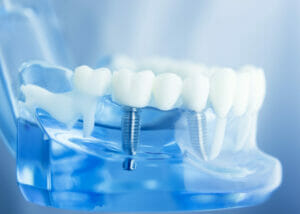
Yet, while there are many advantages to choosing to go with dental implants, there are also some downsides. Knowing what these are ahead of time may help you make a better-informed decision and also prepare you for what lies ahead.
What are Dental Implants?
Dental implants are replacements for your natural teeth. They function much in the same way and will easily blend with the rest of your teeth, both in appearance and in how they feel. A three-step process is required, starting with the preparation of the area of the mouth to receive the implants, which sometimes requires extractions.
Next, an artificial, non-toxic titanium root, looking much like a screw, is created and inserted in the jawbone directly below where the tooth is missing. This addition will serve as the new tooth root. Above this titanium screw, your dentist will then add an abutment or connector for the restoration (crown, dental bridge, or denture).
What are the Downsides of Dental Implants?
There are some downsides to dental implants, which may prevent you from moving forward or can provide you with the type of information you need to better plan for the experience. These downsides include the following.
You Must be a Good Candidate for Dental Implants
Your dentist will need to assess whether or not your jaw contains enough bone mass for the insertion of dental implants and will adequately hold them in place. If not, you may still be able to get them if you undergo bone graft surgery. Talk with your dentist about this and what it will take to ready your mouth for dental implants.
Dental Implants Require Surgery
Dental implants require a more invasive surgical procedure than other dental options. Any time you have to undergo a surgical procedure, you run the risk of adverse health effects occurring, such as infection. Fortunately, your dentist is aware of potential complications and will provide you with directions and possibly medications following each step in the procedure to make sure you stay healthy.
Dental Implants Require Longer Time to Heal
Dental implants are not a quick fix for dental issues. Instead, healing must occur in stages. If you need tooth extractions or bone graft surgery, you will need time to heal before moving on to the next steps in the process, which includes the surgical insertion of the titanium root.
After this insertion, new bone will begin to grow around the surgically placed implants, and healing can take anywhere from three to 18 months. Once this healing occurs, your dentist will make impressions of the gums in order to create tooth restorations. You will then need to return for the placement of a crown, dental bridge, or dentures.
Dental Implants Are Not Usually Covered by Insurance
Dental implants cost more than many other restorative options, and dental insurance usually does not cover the expense. This is particularly true if you decide to get more than one dental implant.
There is a trade-off here, however, in that dental implants or strong, durable, long-lasting, and positively contribute to the appearance of your smile. They also help to stabilize the adjacent teeth, which can result in additional oral health benefits such as preventing the development of TMJ, continuing misalignment, and the build-up of decay in hidden crevices.
Payment plans are often available to help make dental implants more affordable and accessible to patients.
Restorations Attached to Dental Implants May Need Replacement
Dental implants can effectively last you a lifetime. The restorations attached to these dental implants, however, may not last and potentially need replacing at different times throughout your life. Such restorations include crowns, dental bridges, or dentures.
Yet, by practicing good oral hygiene and staying alert to how you use your teeth, you can extend the life of your restoration. For example, brush and floss daily, schedule bi-annual dental cleanings and exams, wear a mouthguard if needed, and avoid using teeth as a tool or biting down on harder objects such as ice and nuts.
Contact Stiles Dental Care Today to Find out if Dental Implants Are Right for You
Dental implants are a beneficial way to restore the functionality of teeth and improve your smile. Along with all the benefits, however, there are a few downsides. Knowing what these are can help you decide what is best for your particular circumstances.
The team here at Stiles Dental Care can also help by determining if you are a good candidate for these dental implants and guiding you through the various steps involved. Contact our office today to find out more and to schedule a consultation.
